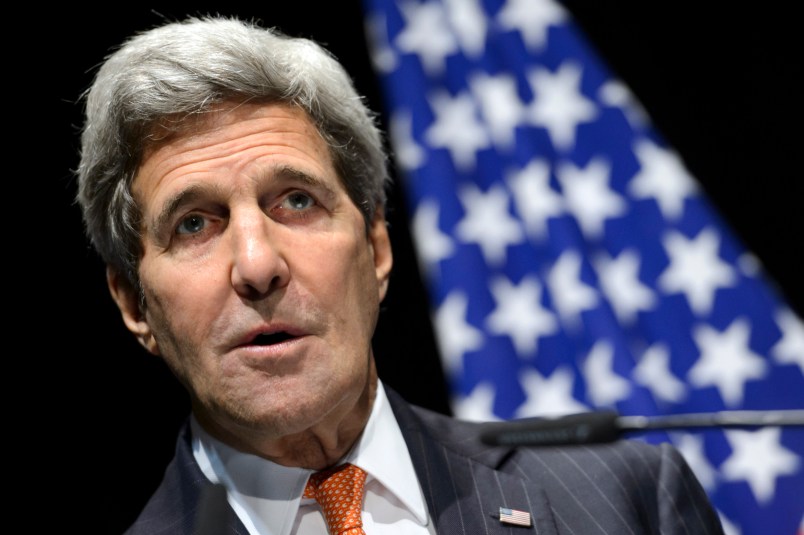LAUSANNE, Switzerland (AP) — Negotiations over Iran’s nuclear program entered a critical phase on Monday with differences still remaining less than two days before a deadline for the outline of an agreement.
With the March 31 target fast approaching, the top diplomats from the five permanent members of the U.N. Security Council, Germany and Iran were meeting to try to bridge remaining gaps and hammer out the framework deal that would be the basis for a final accord to be reached by the end of June.
U.S. Secretary of State John Kerry and his Iranian counterpart, Mohammad Javad Zarif, have been meeting in the Swiss town of Lausanne since Thursday in an intense effort to reach a political understanding on terms that would curb Iran’s nuclear activities in exchange for sanctions relief.
Officials say the sides have made some progress, with Iran considering demands for further cuts to its uranium enrichment program but pushing back on how long it must limit technology it could use to make atomic arms. In addition to sticking points on research and development, differences remain on the timing and scope of sanctions removal, the officials said.
And, in a sign that a deal is unlikely on Monday, Russian Foreign Minister Sergey Lavrov will leave the talks, just a day after arriving, to return to Moscow for previously planned meetings, according to his spokeswoman Maria Zarakhova. Lavrov will return to Lausanne on Tuesday if there is a realistic chance for a deal, she said.
White House spokesman Josh Earnest said on Sunday it was up to the Iranians to make the choice to accept what has been presented to them.
By accepting the restrictions, the Iranians would “live up to their rhetoric that they are not trying to acquire a nuclear weapon,” he said in Washington on ABC’s “This Week.”
The officials in Lausanne said the sides were advancing on limits to aspects of Iran’s program to enrich uranium, which can be used to make the core of a nuclear warhead.
Tehran has said it is willing to address concerns about its stockpiles of enriched uranium, although it has denied that will involve shipping it out of the country, as some western officials have said. One official said on Monday that Iran might deal with the issue by diluting its stocks to a level that would not be weapons grade.
A senior State Department official said that shipping the stockpile is one of the “viable options that have been under discussion for months … but resolution is still being discussed.”
Uranium enrichment has been the chief concern in over more than a decade of international attempts to cap Iran’s nuclear programs. But a Western official said the main obstacles to a deal were no longer enrichment-related but instead the type and length of restrictions on Tehran’s research and development of advanced centrifuges and the pace of sanctions-lifting.
Both demanded anonymity — the State Department official in line with U.S. briefing rules and the Western official because he was not authorized to discuss the emerging deal.
Over the past weeks, Iran has moved from demanding that it be allowed to keep nearly 10,000 centrifuges enriching uranium, to agreeing to 6,000. The officials said Tehran now may be ready to accept even fewer.
Tehran says it wants to enrich only for energy, science, industry and medicine. But many countries fear Iran could use the technology to make weapons-grade uranium.
Copyright 2015 The Associated Press. All rights reserved. This material may not be published, broadcast, rewritten or redistributed.







Let’s see what kind of deal Secretary Kerry can get us.
I for one would prefer negotiation over more wars for someone else’s benefit.
fundamentalists in every country are doing everything they can to stop this not-war.